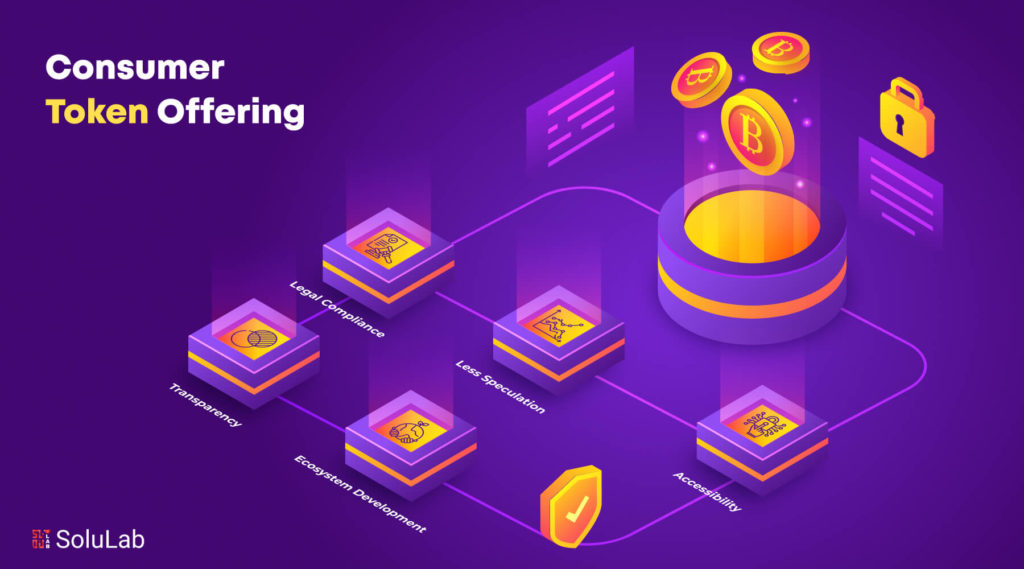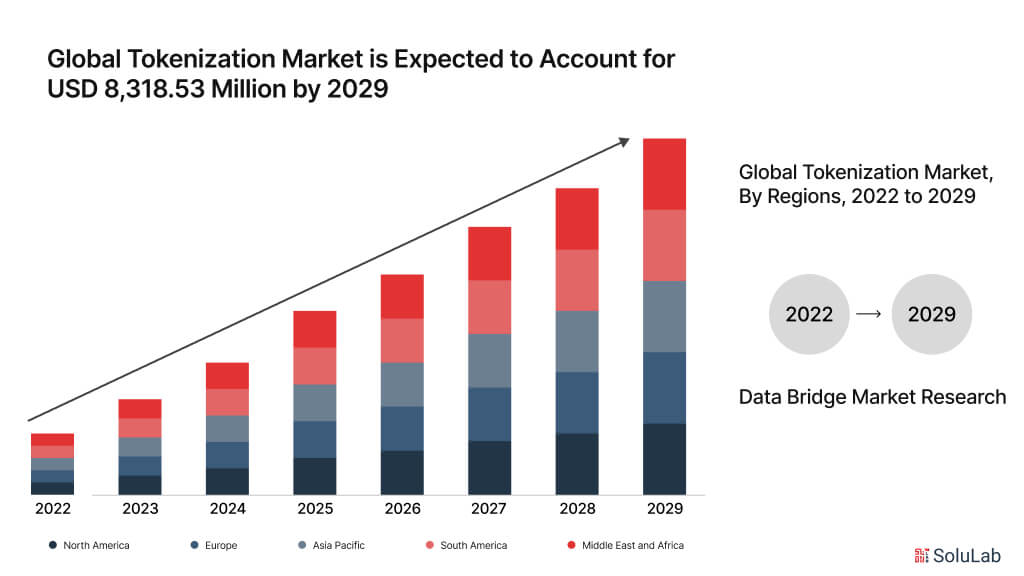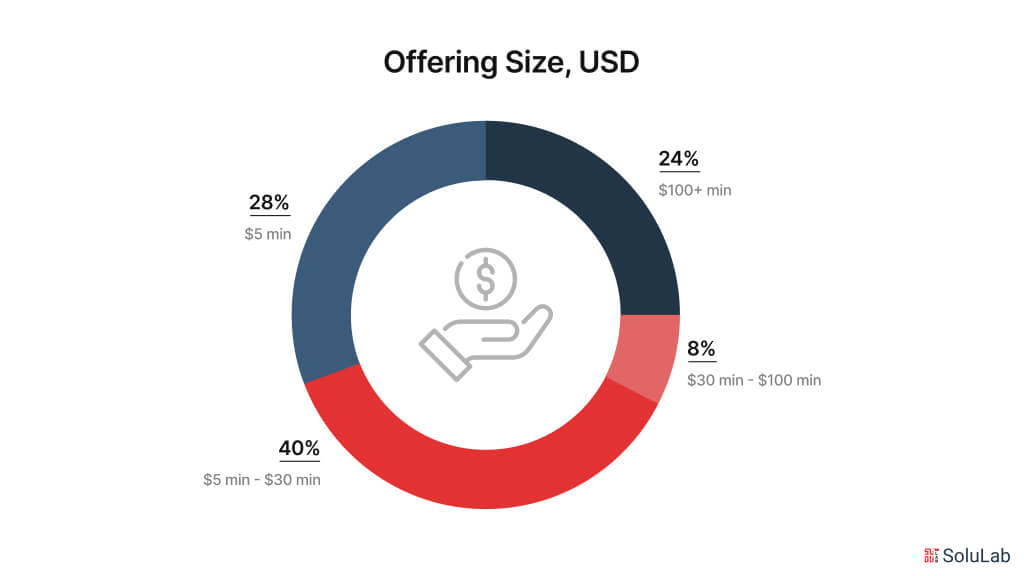
The dynamics of cryptocurrency have constantly evolved in recent years with Initial Coin Offerings (ICO) to Security Coin Offerings (STO) which have paved new ways for Consumer Token Offering (CTO). As the name depicts Coin Token Offerings are about selling tokens that are not considered as securities for a better approach in blockchain-based crowdfunding. Compared to ICOs and STOs, CTOs are more inclined toward providing a user-friendly and easily accessible experience for consumers using tokens designed for practical use rather than investment purposes.
With the rise of Consumer Token Offering (CTO), it is essential to understand the advantages it unfolds, over previous fundraisings. In this blog, we will note down the major differences between ICOs and CTOs, what is a CTO, and highlight the benefits as well. By exploring the real-world use cases, we will talk about the future of Coin Initial Offerings and its impact on blockchain development.
What is Consumer Token Offering?
The newest fund-raising initiative in the world of crypto has now been called Consumer Token Offering. It has been structured in such a way that the user experience is convenient and approachable. While Security Token Offerings (STOs) and Initial Coin Offerings (ICOs) are engaging and can convince investors to buy coins, a Coin Token Offerings (CTO) concentrates on selling tokens for usage, and not investment.
Tokens are distributed to consumers using a Consumer Token Offering, spendable upon the goods and services in the ecosystem project. The consumers’ tokens are not tradable on the open market and are not considered securities. This has been the cause of the regulatory problem with ICOs, STOs, and IEO crypto because they look just like standard security offerings. This works around the issues this way.
The demand for blockchain projects to develop amid changing regulatory environments, while at the same time figuring out how to deliver real value to end-users, has driven the need for the creation of Consumer Tokens. The Brooklyn Project, a crypto legal collective supported by ConsenSys, developed the “Consumer Token Framework” to offer guidance for the responsible development and promotion of consumer tokens.
The Most Recent Market Data on CTO Growth
The real estate investment trust (REIT) CTO growth is focused on income asset acquisition and management. The global tokenization market was valued at USD 2.81 billion in 2023. The market is projected to be worth USD 3.32 billion in 2024 and reach USD 13.20 billion by 2032, exhibiting a CAGR of 18.8% during the forecast period (2024-2032)
These most recent financial results and market data show the performance and market position of Consumer Tokens Growth in the real estate investment trust industry.

Why is a Consumer Token Offering Required?
STOs came across when Initial Coin Offering (ICO) was turning into scams and offering weak projects to their consumers with no scope in the future. On the other hand, STOs were providing a more friendly, regulation-specific approach to comply with while launching a security token. Crypto Consumer Token Offerings are an integral factor in overcoming the inadequacies of the earlier models, such as Initial Coin Offerings and Security Token Offerings, which were essential in the fundraising landscape. The main driving force behind the increasingly prominent positioning of a CTO crypto meaning is the need for a customer-centric token sales strategy, wherein tokens would be used for actual purchases of products and services rather than merely being traded on the open market.
As blockchain platform technology gathers momentum, the demand for chief technical officers will naturally rise. Consumer tokens frameworks are likely to be extremely in demand, and many of the leading voices in the space have gone so far as to say that 2019 and 2020 will be the years of the chief technical officer, with Joseph Lubin leading the charge on this narrative.
How does Consumer Token Offering Work?
Consumer tokens are made available in CTO crypto, which they can use to pay for products and services within the project’s ecosystem. The tokens offered to consumers are not meant to be traded on exchanges and are not considered securities. Here are some points to understand the workings of a CTO:
| STEP | DESCRIPTION |
| Token Design | While designing the consumer token, the project team adheres to the consumer token framework decreed by the Brooklyn Project. This involves ensuring that such a token is consumable and usable, with no equity-like features. |
| Token Description | Participants will receive the consumer tokens fairly, transparently, and accountable. This would entail both a private and a public space. These disturbed terms are subjected to limited theories and are well-defined. |
| Token Utilization | Once the tokens are obtained, consumers can then use them to make purchases. These tokens cannot be exchanged and sold again. |
| Project Management | The project upholds orderly and transparent governance structures with distinct roles. The stakeholders are kept informed about the project’s progress constantly. |
| Regulatory Compliance | CTOs are required not to violate any rules and laws in the regions where they operate. The project team closely cooperates with legal experts to ensure that the service follows all regulations. |
Consumer Token Offerings are a new breed of blockchain-based fundraising that lends precedence to consumer participation and usefulness over mere speculative trading. CTOs work toward engaging in a more sustainable and inclusive setting of the Bitcoin market, with a significant emphasis on the compliance regime and real-life applications. With the rise of Consumer Tokens, blockchain startups can now raise capital and engage customers in a much more direct and transparent way.

How Do Regulators Get Approval for CTO?
Authorities in the process of approval are essential in safeguarding consumer interests and ensuring that CTOs comply with existing laws and regulations. The following presents a summary of major steps that authorities take in approving CTOs:
- Framework Development: The framework drafted by projects such as The Brooklyn Project is reviewed by regulators like the U.S. Securities and Exchange Commission. It describes the characteristics of Consumer Tokens Creation, mainly hinging on their consumptive nature, in contrast to securities. By doing this, CTOs remain compliant with regulatory thresholds.
- Legal Consultation: Most companies seek legal specialists to go through the distribution strategies and token structures before launching a CTO. In this way, one can make sure that tokens lack any characteristics that might secure their traits and have them considered securities, such as those sharing similarities with equity. To sail through this complex regulatory environment and reduce potential risks, one needs legal assistance.
- Transparent Documentation: A business is required to provide the full documentation of the function, purpose, and usage of each token within an ecosystem. With such documents, regulators can use them to determine if an offering is legal regarding consumer protection and regulatory standards.
- Regulatory Agency Interactions: Lines of contact with the regulatory agencies should be kept open. Companies may need to have pre-filing discussions to resolve any issues and clarify what may be expected under regulations. This planning enables the project and authorities to build confidence and could help smooth the approval process.
- Compliance Monitoring: After approval of the crypto CTO, there will be the need for continued compliance. The regulators may require periodic reporting as regards the development of the project and compliance with the laid-down parameters. This monitoring, throughout the life of the token, ensures that the offering remains compliant and customer interests are protected.
The process of approving consumer token offers is a collaborative effort in which companies and regulatory bodies work together. Following the established norms, comprehensive legal consultation, and transparency can help firms negotiate this regulatory landscape effectively to facilitate the introduction of compliant and successful CTO initiatives.
Startups That Have Used CTO
Although they are a relatively new fundraising mechanism, blockchain use cases already make use of Consumer Token Offerings. One of the pioneers in this space is the media platform Civil, which deploys blockchain technology to guarantee a future for sustainable news. In 2018, Civil introduced the CVL token, using which customers can buy premium content but also to tip journalists.
Another decentralized computing network company utilizing CTOs is Blockstack. After raising $23 million from more than 4,500 investors, Blockstack became the first startup to be approved by the SEC for a CTO in 2019. The apps on the Blockstack network are usable and fueled by the company’s STX tokens.
These examples demonstrate how CTOs should prioritize customer involvement, ensure legality, and provide a competitive alternative to traditional fundraising methods. We may see a lot of innovation in ICO vs. IPO in this space and this model will be adopted by the blockchain ecosystem once more firms explore the opportunities outlined by chief technology officers.
Use Cases of Consumer Token Offerings

Consumer Token Offerings are rapidly becoming the game-changing tool in the blockchain world that empowers entrepreneurs to interact directly with customers while offering them real value. Here are a few noteworthy use cases that would portray how CTOs have been employed in many areas, including the following:
-
Civil Media
A CTO supported Civil— a blockchain-based journalism platform—through the launch of its token, CVL. It enables the a la carte purchasing of premium content on the platform and allows customers to easily support journalists. The CC model not only empowers readers with choice over the type of news they would like to pay for but also provides a steady flow of revenue to content producers that would go to great lengths to ensure that journalism is done right past the digital era.
-
Kik by Kin
The Kin token was introduced by Kik Interactive and is used across the Kin Ecosystem and within its messaging application. The CTO can provide several opportunities for users to earn and spend their Kin tokens for various services, such as the purchase of digital goods or access to premium content. This exemplifies how CTOs can power community-driven ecosystems by enhancing user engagement and creating an economy around the Kik platform.
-
BlockStack
Blockstack—after a raise of $23 million—became the first company to have the CTO approved by the SEC. You do need STX tokens to have access to dApps that one has developed on top of the Blockstack platform. Blockstack is a perfect example of how CTOs can promote the use of decentralized technologies while providing real value for customers in that it allows payment for services with STX tokens.
-
Brave Web Browser
Brave is a privacy-centric web browser that uses a customer token system through the Basic Attention Token, BAT. Under this system, users are paid BAT tokens to receive advertisements and can resell them to purchase services or give them back to the content creators. Along these disruptive paths, the basic attention token shifts priority to the user’s discretion of privacy, altering ad space by increasing user engagement.
-
The Everipedia
IQ tokens serve as a reward mechanism in the decentralized encyclopedia Everipedia for the creation and editing of content. When expertise is offered via CTO, users are either allowed to vote on content or to provide premium features in return for IQ tokens. Such an approach binds the validity of the platform towards the users of the information and incentivizes community development.
Security token offerings that facilitate direct interaction of startups with customers and provide real value have an application in utility instead of mere speculation. CTOs help to develop sustainable ecosystems that serve the interests of the users and producers by enabling the potential for innovation and community-driven growth into the huge blockchain ecosystem, which is increasingly being adopted by businesses.
Benefits of Consumer Token Offering
CTOs present several advantages to consumers, businesses, and the blockchain ecosystem in general, offering a strong substitute for the former traditional fundraising methods. Here are the main Benefits of a CTO:
1. Legal Compliance
Unlike Initial Coin Offerings, which were plagued by a host of legal problems, CTOs are tailored to fall within the ambit of existing laws and regulations. By focusing on consumer tokens not considered securities, the risk of fines or shutdowns can be reduced and the legal framework within which they reside may be traveled more easily.
2. Less Speculation
By putting a cap on the resale of tokens, CTOs intend to bring down cases of speculative trading. This assists in keeping the focus on the utility value that tokens can deliver within the ecosystem of a project and not on their volatile price swings. It is through the alignment of incentives within actual use that CTOs can ensure a more engaged and sustainable user base.
Related: What Are Wrapped Tokens?
3. Accessibility
Whereas STOs are accessible only to accredited investors, Consumer Tokens open up a financing opportunity for an enormous public. Therefore, more and more people will now have the chance to invest in blockchain-related initiatives and from their success by democratizing access.
4. Transparency
While designing, distributing, and governing their tokens, successful CTOs pay high attention to transparency. Following frameworks like the one crafted by The Brooklyn Project allows a CTO to ensure that stakeholders are well-informed about the development of a project, team, and token use.
5. Ecosystem Development
By emphasizing real-world applications and interaction with customers, CTOs help to build out the entire blockchain ecosystem. The more projects that implement this strategy, the stronger the feedback loop becomes, pushing industry growth, innovation, and adoption higher.
Take Away
In summation, CTOs are a major development in the fundraising space because they provide entrepreneurs with a legal, effective, and customer-oriented method. CTOs encourage sustainable ecosystems that are beneficial to the customers and the businesses by emphasizing practical utility and limiting speculation. Blockchain development companies create new avenues for community participation and innovation in the expanding blockchain space.
SoluLab can help you should you be considering hiring a CTO or looking into blockchain technologies for your company. Being fully committed to creative problem-solving and having deep knowledge of blockchain technology, we can help you at every stage of this procedure. Get in touch with us now for more information on how we can help you on your blockchain journey!
FAQs
1. What is a consumer token offering?
Through an event called a Consumer Token Offering, a startup can raise funds by selling tokens created specially for customers. Unlike securities and speculative investments, CTO meaning crypto that these tokens can be used for purchasing products or services within the ecosystem of a project.
2. What differentiates CTOs from STOs and ICOs?
Utility and interaction for users is something that CTOs on the other hand, prioritize, unlike STOs, dealing with regulated securities and ICOs very often aimed merely at speculation. Tokens have a particular purpose within the ecosystem itself because CTOs are designed to be useful in practice.
3. What are the regulatory considerations CTOs should be working within?
The legal risks are minimized as CTOs are structured to comply with existing laws. Tokens that have a consumptive nature and do not fall under securities can better position firms against the regulatory backdrop while seeking approval from regulatory bodies like the SEC.
4. What are some of the successful cases of CTOs?
Among them are the successful CTOs, including Kin, which empowers transactions within the Kik messaging app, and Civil, which makes use of its CVL token to pay for journalism. These examples show how a CTO would build an ecosystem sustainable for producers and consumers.
5. How can SoluLab contribute to a CTO launch?
SoluLab is a blockchain solutions provider specializing in creating and launching ICOs. From token designing to complying with regulatory requirements, our team can help you all along the way to make this a successful and prominent launch. Connect with us now to learn more!





